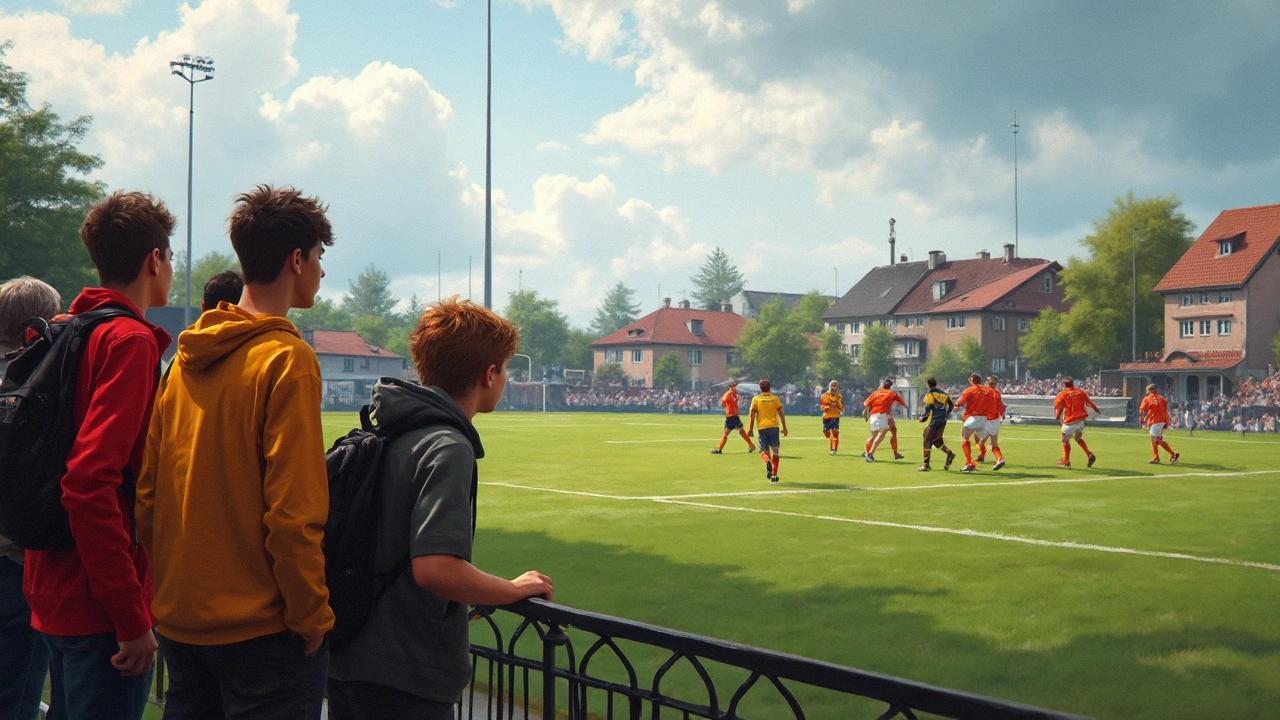Rugby in Germany: Why Isn’t It Popular?
 Jun, 12 2025
Jun, 12 2025
If you flip through German sports channels or scroll local fixture lists, rugby barely shows up. Football takes over everything: news, stadiums, even park fields on weekends. But why is rugby so invisible in Germany, especially when it’s roaring in places like England or France?
It’s not because Germans don’t like tough, team-focused sports. Rugby just never found a big stage here. Even when German clubs play, you’re more likely to hear about them from an expat group than from the mainstream press. While expats keep small clubs alive in cities like Heidelberg and Hanover, most Germans wouldn’t know their national team ranking (for the record, it bounces around the 30s globally).
And here’s the thing: if you’re a rugby fan visiting Germany, watching a live match will take some work. There’s no Bundesliga of rugby splashed on primetime. Most games feel local and under-the-radar, hidden behind football's shadow. Still, the sport isn’t extinct—just living on the sidelines. Want to find out where and why? Stick around as we dig in.
- How Rugby First Landed in Germany
- Why Football Rules the Country
- The Struggles and Surprises of German Rugby
- Rugby Fixtures: Where and How to Watch
- What Could Turn the Tide for Rugby in Germany?
How Rugby First Landed in Germany
Rugby snuck into Germany way back in the late 1800s, mainly thanks to British students and workers bringing their love for the game across the Channel. The first known rugby match on German soil happened in 1872, played between two teams of Englishmen living in Hanover. Pretty wild, right? This was just a casual thing at first, but it slowly started to catch on—mostly in areas with lots of international influence.
Things got a bit more serious in 1900 when Germany actually put together a team for the Paris Olympics. They didn’t win, but just being there says a lot. Clubs popped up in cities like Frankfurt, Hamburg, and especially Heidelberg, which kind of became German rugby’s unofficial home base. By the time World War I rolled in, there were already a couple dozen clubs doing their thing.
The big problem? Rugby never hit the mainstream. German schools and youth programs leaned toward gymnastics and, later, football. Rugby always felt kind of outside the system—like something for expats, students, or weird sports lovers willing to try anything once.
Here’s a quick breakdown of early rugby milestones in Germany:
- 1872: First recorded match in Hanover (English expats only)
- 1889: First German rugby club founded—DRC Hannover
- 1900: Germany competes in the Olympic rugby tournament
- 1920s: Heidelberg rises as the rugby hub
To put things in perspective, check this mini-table comparing club numbers over time:
| Year | Estimated Rugby Clubs in Germany |
|---|---|
| 1900 | ~10 |
| 1920 | ~30 |
| 1950 | ~60 |
| 2025 | ~120 |
So, it’s not like rugby never had fans or real clubs—it just always played backup to bigger, louder sports. And that’s the story of how rugby first tried to settle into German life, only to remain just out of the spotlight.
Why Football Rules the Country
Look around any German city or village, and you’ll bump into football everywhere. Out of 80,000 sports clubs in Germany, over 25,000 are dedicated to football. That’s almost a third of all clubs playing just one game. No other sport in Germany even comes close.
There’s some history behind this. The German Football Association (DFB) started way back in 1900, and after the 1954 World Cup win, football really became part of the national identity. These days, you’ve got Bundesliga matches on free TV, massive stadiums packed every week, and kids in every town dreaming of playing for Bayern Munich or Borussia Dortmund. Football isn’t just a pastime—it’s everywhere: schools, ads, beer gardens, even politics.
Rugby, meanwhile, hasn’t had the same push. German schools almost never offer it in PE—that spot goes to football or handball. And if you’re hoping to watch international rugby tournaments on TV, you’ll probably be out of luck unless you hunt down a dodgy stream or a rare sports bar with expats. Most people simply don’t know the rules or the local clubs.
When the country puts so much money and energy behind football, it’s no shock that everything else gets squeezed out. Big sponsors, top media coverage, and government support all go straight to football. If you want to launch a sports club in Germany, picking rugby over football is like trying to sell sausages at a vegan festival—it’s possible, but you won’t have crowds lining up.

The Struggles and Surprises of German Rugby
German rugby faces a real uphill battle, and it shows in the numbers. There are only around 130 rugby clubs across the entire country, with the biggest clusters in cities like Heidelberg, Frankfurt, and Hanover. Compare that to football’s roughly 27,000 clubs—it’s a whole different universe.
Most Germans are surprised to hear their country has a rugby national team. The German Rugby Federation (DRV) has been around since 1900, but the sport is practically invisible in schools and on TV. Almost no public schools have rugby teams, so kids just don’t bump into the sport naturally. Training fields and proper facilities are rare, which makes it even harder for clubs to grow.
On the brighter side, there’s a tight-knit community around rugby in Germany. Clubs like Heidelberger RK and SC 1880 Frankfurt have managed to win actual European club titles, even beating teams from rugby-heavy countries like Romania. And when the German team qualified for the final stage of the 2019 Rugby World Cup qualification, it was headline stuff—at least among rugby fans. But most Germans had no idea it even happened.
Money is another problem. Sponsors go for football, handball, or ice hockey first every time, leaving rugby clubs hustling for scraps. Many teams rely on volunteers, and even the top league—the Rugby-Bundesliga—operates with tight budgets. If you check a fixture list, you’re not going to see major stadiums. Games happen at small local grounds, sometimes with just a couple hundred fans watching.
Here’s the unexpected kicker, though: the expat scene keeps the sport alive, especially in bigger cities. British, French, and South African expats join clubs, coach local teams, and organize youth programs. They bring in new energy, run Oktoberfest rugby matches, and keep fixtures ticking over despite all the hurdles.
So, while rugby fights for space in Germany’s packed sports calendar, it’s not all doom and gloom. There’s passion, funny stories (like a few matches played during snowstorms), and the kind of community feel you don’t get in big-time pro leagues. It’s just happening off the radar, one scrappy match at a time.
Rugby Fixtures: Where and How to Watch
Trying to catch a rugby match in Germany can feel like hunting for a hidden club in Berlin. The big games just aren’t on regular TV. Forget turning on ARD or ZDF expecting to see Six Nations or Rugby World Cup highlights. The focus is always on football, Formula 1, or handball instead.
Still, if you know where to look, you won’t miss out completely. The main league here is called the Rugby-Bundesliga, with clubs mostly from the south and west—think Heidelberg, Frankfurt, and Hanover. Fixtures usually run from September to May, with matches mostly on weekends. Scores, schedules, and club news show up on the official league website (rugbyweb.de), which covers both men's and women’s divisions in German and a bit of English. For English-language news, TotalRugby.de and the clubs’ own sites help make sense of things.
If you want to watch games, you’re better off finding a local field. Matches rarely stream live, except sometimes on YouTube or a club’s Facebook page. Once in a blue moon, big international tournaments like the Rugby World Cup get a slot on DAZN or Eurosport. Bars and Irish pubs in big cities sometimes stream major international fixtures, especially during World Cup season or Six Nations, but you’ll need to check ahead.
- Check rugbyweb.de for up-to-date Rugby-Bundesliga rugby fixtures each week.
- Look up club socials—Heidelberger RK and TSV Handschuhsheim are active on Instagram and Facebook with livestreams and match info.
- For big international games, search out English or Irish pubs, especially in cities with a strong expat vibe like Munich or Berlin.
- If you’re hoping to play or watch in person, most clubs welcome visitors. Just show up, grab a bratwurst, and watch the action.
Bottom line: watching rugby in Germany means being a bit resourceful. The community is still small, so news and video often travel through word of mouth or niche online groups instead of big-name broadcasters.

What Could Turn the Tide for Rugby in Germany?
It’s not impossible for rugby to gain real traction in Germany, but it’s going to take some work and smart moves. There are a few key spots where change could actually make a difference.
First up, the schools. Right now, almost no German kids grow up with rugby on their gym class radar – football, handball, and athletics crowd out almost everything else. If a grassroots push put real rugby programs in schools, it could spark more interest. Back in 2015, the German Rugby Federation launched a few pilot programs in schools, but those haven’t gotten nationwide support yet.
TV and streaming are another biggie. Rugby matches barely get aired, and sports fans can’t get hooked on what they never see. Imagine if some Bundesliga rugby matches actually made it to free TV – or if streaming platforms gave easy access to the top local matches, highlights, or even Six Nations games dubbed in German. The exposure itself could slowly grow the fanbase.
Germany could also help itself by making rugby more visible on university campuses. A bunch of international students turn up with rugby experience from the UK, France, South Africa, or Australia. If universities promoted rugby fixtures and matches, it could set a vibe that sticks with young adults after they graduate.
- Get school rugby programs nationwide
- Invest in streaming and TV deals for local fixtures
- Encourage university clubs to host public matches
- Offer free try-out events in big cities
- Create simple, relatable marketing – ditch complex lingo
Money is always part of the story. According to a 2023 survey by the German Olympic Sports Confederation, rugby gets less than 0.2% of amateur sports funding compared to football’s whopping 35%. Check it out:
| Sport | % of Amateur Funding |
|---|---|
| Football (Soccer) | 35% |
| Handball | 6% |
| Basketball | 4% |
| Rugby | 0.2% |
Clearly, funding shapes what kids and adults pick up. If rugby wants a shot, the German Rugby Federation might have to target grants, corporate sponsors, or EU sport initiatives. No one’s saying rugby will dethrone football overnight, but with more visibility, better funding, and a push from schools and colleges, there’s a solid path to more rugby fixtures across Germany. And who knows? Maybe one day, you’ll see rugby highlights pop up on Germany’s top morning shows.